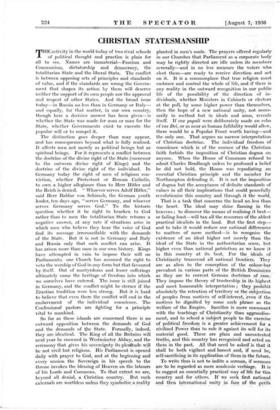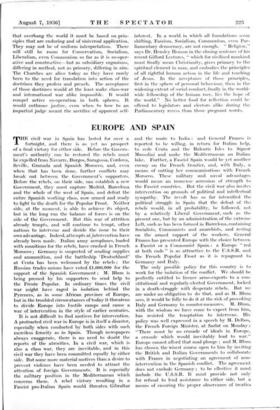CHRISTIAN STATESMANSHIP
THE activity in the world today of two rival schools of political thought and practice is plain for all to see. Names are immaterial—Fascism and Communism, dictatorship and democracy, the totalitarian State and the liberal State. The conflict is between opposing sets of principles and standards of value, and if the standards are wrong the Govern- ment that shapes its action by them will deserve neither the support of its own people nor the approval and respect of other States. And the broad issue today—in Russia no less than in Germany or Italy— and equally, for that matter, in our own country, though here a decisive answer has been given—is whether the State was made for man or man for the State, whether Governments exist to execute , the popular will or to compel it.
The distinction goes deeper than may appear, and has consequences beyond what is fully realised. It affects men not merely as political beings but as spiritual beings. For it represents a conflict between the doctrine of the divine right of the State (successor to the outworn divine right of Kings) and the doctrine of the divine right of the individual. In Germany today the right of men of religious con- viction, whether Protestant or Roman Catholic, to own a higher allegiance than to Herr Hitler and the Reich is denied. " Whoever serves Adolf Hitler," said Herr Baldur von Schirach, the German youth leader, ten days ago, "serves Germany, and whoever serves Germany serves God." To the historic question whether it be right to hearken to God rather than to men the totalitarian State returns a negative answer, at any rate if situations arise in which men who believe they hear the voice of God find its message irreconcilable with the demands of the State. But it is not in Germany and Italy and Russia only that such conflict can arise. It has arisen more than once in our own history. Kings have attempted in vain to impose their will on Parliaments; one Church has assumed the right to veto the worship of God in any form but that favoured by itself. Out of martyrdoms and lesser sufferings ultimately came the heritage of freedom into which we ourselves have entered. The issue is still joined in Germany, and the conflict might be sterner if the Erastian tradition, were less strong. But it is hard to believe that even there the conflict will end in the enslavement of the individual conscience. The Confessional pastors are fighting for a principle vital to mankind.
So far as these islands are concerned there is no outward opposition between the demands of God and the demands of the State. Formally, indeed, they are identical. The King of all the Britains will next year be crowned in Westminster Abbey, and. the ceremony that gives his sovereignty its plenitude will be not civil but religious. His Parliament is opened daily with prayer to God, and at the beginning and every session the Soyereign in his speech to the throne invokes the blessing of Heaven, on the labours of his Lords and Commons. To that extent we are, beyond all denial, a Christian country.. But such externals are worthless unless they symbolise a reality planted in men's souls.- The prayers offered regularly in our Churches that Parliament as a corporate body may be rightly directed are idle unless its members severally—and in no less measure the voters - who elect them—are ready to receive direction and act on it. It is a commonplace that true religion must embrace and control the whole of life, and if there is any reality in the outward recognition in our public life of the possibility of the direction of in- dividuals, whether Ministers in. Cabinets or electors at the poll, by some higher power than themselves, then the hope of a new national unity, not neces- sarily in method but in ideals and aims, reveals itself. If vox populi were deliberately made an echo of vox Dei, or as near as human fallibility would allow, there would be a Popular Front worth having—and the only one. That argues no narrow interpretation of Christian doctrine. The individual freedom of conscience which is of the essence of the Christian faith forbids the imposition of Christian dogma on anyone. When the House of Commons refused to admit Charles Bradlaugh unless he professed a belief he did not hold, the House was repudiating , an essential Christian principle and the member . for Northampton defending it. It is not the imposition of dogma but the acceptance of definite standards of values in all their implications that could peacefully revolutionise this country and through it the world. That is a task that concerns the head no less than the heart. The ideal may shine flaming in the heavens ; to discover the means of realising it best— or failing least—will tax all the resources of the ablest practical idealists in the land. But the first step and to take it would reduce our national differences to matters of mere method—is to recognise the existence of an ideal higher not merely than the ideal of the State in the authoritarian sense, but higher even than national patriotism as we know it in this country at its best. For the ideals of Christianity transcend all national frontiers. They are as alien to the conception of the, colour-bar prevalent in various parts of the British Dominions as they are to current German doctrines of race.. They impose the theory of trusteeship. in its highest and most honourable interpretation ; they „prohibit absolutely the retention of territory or the subjection of peoples from motives of self:interest, :even if the motives be dignified by some such phrase as the welfare of the Empire. Sacrifice is more consonant with the teachings of Christianity than aggrandise- ment, and to school a subject people to the exercise of political freedom is a greater achievement for a civilised Power than to rule it against its will for its material good. These are plain and uncontested truths, and this country has recogniSed and acted on them .in the past. All that need be asked' is that it shall be both vigilant and honest and, if need be, self-sacrificing in its application of them in the future.
To write thus is not to indite a sermon, if sermons are to be regarded as mere academic verbiage. It is to suggest an essentially practical way of life for this country and for others. If we seek first national and then international unity in face of the perils that overhang the world it must be based on prin- ciples that are enduring and of universal application. They may not be of uniform interpretation. There will still be room for Conservatism, Socialism, Liberalism, even Communism so far as it is co-oper- ative and constructive—but as subsidiary organisms, differing in method, not as primary, differing in aim. The Churches are alive today as they have rarely been to the need for translation into action of the doctrines they profess and preach. The acceptance of those doctrines would at the least make class-war and international war alike impossible. It would compel active co-operation. in both spheres. It would enthrone justice, even when to bow to an impartial judge meant the sacrifice' of apparent self- interest. In a world in which all foundations seem shifting, FaiCiSin, Socialism, Communism, even Par- liamentary democracy, are not enough. " Religion." says Dr. Hensley Henson in the closing sentence of his recent Gifford Lectures, " which for civilised mankind must finally mean Christianity, gives primacy to the spiritual element in man, and embodies the principles of all rightful human action in the life and teaching of Jesus. In the acceptance of those principles, first in the sphere of personal behaviour, then in the widening extent of social conduct, finally in the world- wide fellowship of the human race, lies the hope of the world." No better food for reflection could be offered to legislators and electors alike during the Parliamentary recess than those pregnant words.







































 Previous page
Previous page